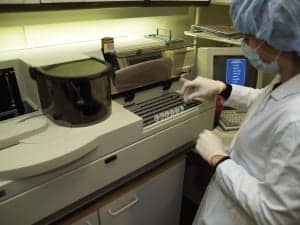Amidst ongoing debate in Congress over reforming the nation’s health care system, a new report from the Lewin Group finds that screening and diagnostic laboratory tests are central to achieving some of the most important goals of health care reform.
According to the report, tests for such conditions as diabetes, cervical cancer, drug-resistant infections, and metastatic colon cancer are enabling important strides in early detection and diagnosis, as well as in helping physicians select treatments that will work most effectively for patients. The net result is often better health outcomes for patients and greater savings and economic efficiencies for the health system–all key goals of health reform. The report was released today in a briefing at the National Press Club in Washington D.C.
"Screening and diagnostic tests contribute to health care value across the spectrum of care," says the report. It addresses the cost and clinical implications of lab testing by focusing on four areas:
- Rapid diagnostic tests for hospital-acquired MRSA infections: Hospital-acquired infections (HAIs) cause 99,000 deaths and $20-$45 billion in health care costs annually. Antibiotic-resistant staph infections, called MRSA, cause half of HAIs. Rapid MRSA lab tests allow hospitals to identify the infection quickly and take action to limit its spread.
- KRAS genetic testing: In metastatic colorectal cancer, the genetic test for the KRAS gene mutation can now determine which patients will benefit from specific drugs, and which will not. This allows many patients to avoid serious side-effects and enables physicians to select the most effective treatment from the start. The test could save $740 million per year, according to one estimate.
- HbA1c blood glucose testing: Substantial evidence supports the value of HbA1c testing as a screening and diagnostic tool for diabetes and prediabetes. Delaying the onset of diabetes and improved management of the disease can reduce complications, the risk of death, and costs for treatment. The total cost of diabetes is $174 billion a year, about $58 billion of that attributable to lost worker productivity.
- HPV DNA testing for cervical cancer: Genetic tests for the HPV viruses that cause cervical cancer are improving diagnostic accuracy in identifying the disease at its earliest stages. The tests are leading to improved disease-free survival and quality of life, along with reductions in disease occurrence, death, and progression to advanced cancers.
"Recent scientific and technological advances have led to molecular-level and genetic testing, including pharmacogenomics, that enable tailoring therapies to subgroups and individuals to ensure ‘the right treatment for the right patient at the right time,’" says the report. "Laboratory testing has a central role in personalized medicine, whose extraordinary potential is recently emerging into practice."
The report and briefing are sponsored by the American Clinical Laboratory Association, Results for Life and AdvaMed. The full report and briefing materials will be available at www.labresultsforlife.org and www.advamed.org.


